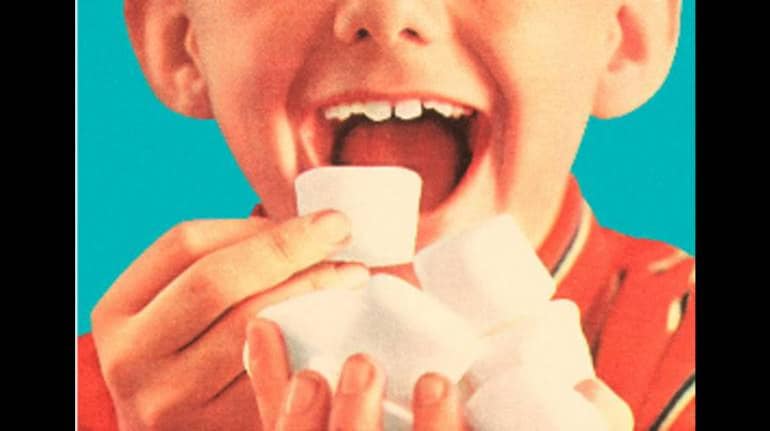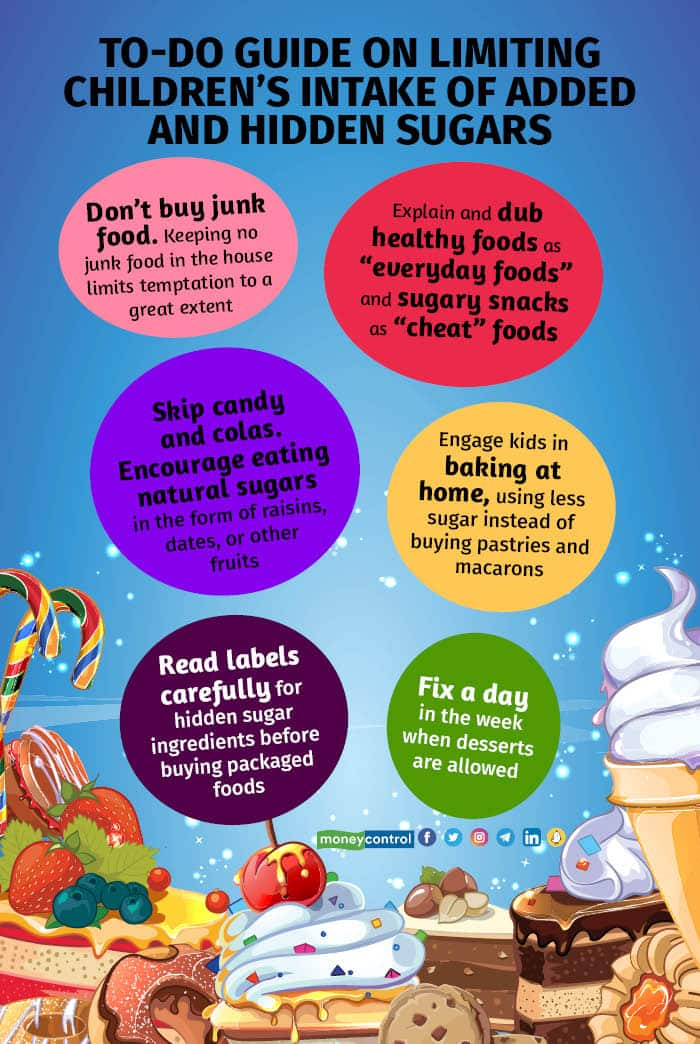



Earlier this month, social media influencer Revant Himatsingka (Foodpharmer) raised a question mark over the purported health benefits of Mondelez’s Cadbury Bournvita - he released a video on social media claiming that the popular milk additive has high sugar content and its consumption could lead to diseases such as diabetes and cancer. Shortly afterwards, Mondelez sent him a notice to take the video down.
All this has clouded the claims of that vitamin-kick in milk additives. To be sure, sugary foods and desserts can be moreish. And the old adage, a little bit of sugar helps the medicine go down, is a justification parents and grandparents often give for giving their children sugar-laden foods.
We are aware of the health effects of sugar on us as adults, but often discount the effects that added, hidden and excessive sugar can have on children - from cavities to juvenile diabetes and a range in-between. So how well do the young tolerate added sugars, and how to protect them against added sugar hidden in packaged foods and syrups and medicines, even? Read on.
 Graphic by Upnesh Raval/Moneycontrol
Graphic by Upnesh Raval/Moneycontrol
Eating sugar, no papa
With childhood obesity and juvenile diabetes on the rise, can we afford to ignore the hidden sugar problem?
“Our body needs sugar, not additional sugar in any form,” explains Dr Vishal Parmar, consultant paediatrician, Wockhardt Hospital Mira Road, Mumbai. “Children need a sound diet with an overall nutrient balance to promote their growth and development. Our bodies tend to break down the carbohydrates into glucose. However, the body does not need additional sugar in the form of colas, sodas, juices, sweets, desserts, and candies. Consuming large amounts of sugar in the form of additives to milk, processed beverages and packaged foods can lead to obesity which can further raise the chances of cancer, high blood pressure, cholesterol levels, and type 2 diabetes in adult life.”
Some parents desist from giving sweet somethings to their tots early on. Do children below two years of age need sugar? “Ideally white sugar should not be introduced during the early years, especially when the child is less than one year of age,” says Dr Parmar. A tough call as there is hidden sugar in everything: from that cough syrup to that bread loaf to calcium gummies to even that homemade honeyed chicken. The dangers posed for young bodies lurk large, keeping in mind synthetic foods and urban lifestyles that make lip-smacking desserts, confectionery at birthday parties and beyond, and sugary treats galore for kids a reality. When the tiny tots indulge in sweet treats at night, the sugar rush is visible in hyperactivity and subsequent tooth decay. This pattern of consumption also leads to unhealthy cravings as children grow up.
Also read: Bournvita row: Twitter account of influencer 'Foodpharmer' hacked, followers deleted'
How much is too much
Neha Pathania, chief dietitian, Paras Health, Gurugram, says, “The amount of sugar considered permissible per day for kids and adults can vary based on factors such as age, sex, weight, and physical activity level.” The American Heart Association (AHA) recommends the following limits on added sugars:
Children aged 2-18: No more than 6 teaspoons (24 grams) of added sugars per day
Women: No more than 6 teaspoons (24 gm) of added sugars per day
Men: No more than 9 teaspoons (36 gm) of added sugars per day.
While white sugar is refined sugar obtained from sugarcane, jaggery, khandsari sugar, and date powder are often considered to be healthier alternatives. Or are they?
“Jaggery is a traditional unrefined cane sugar made by boiling sugar cane juice until it solidifies. Unlike white sugar, jaggery retains some of the minerals and antioxidants that are present in the sugar cane plant. It also has a lower glycemic index than white sugar, which means that it may cause a slower rise in blood sugar levels. However, jaggery is still a form of sugar and should be consumed in moderation. Likewise, khandsari sugar is unrefined cane sugar made by boiling and crystallising sugarcane juice, and retains some of the minerals and antioxidants that are present in the sugarcane plant. Again, khandsari, too, has a lower glycemic index than white sugar, but should be consumed in moderation,” advises Pathania.
“Date powder is a natural sweetener made from dried dates. It contains natural sugars, fibre, and some vitamins and minerals. Unlike white sugar, date powder does not cause a rapid spike in blood sugar levels. However, it is still a source of calories and should be consumed in moderation. In general, these alternative sweeteners may offer some health benefits over white sugar due to their lower glycemic index and higher nutrient content. However, they are still sources of sugar and should be consumed in moderation as part of a balanced diet. The marginal difference between these sweeteners and white sugar will depend on factors such as the quantity consumed and an individual’s overall diet and health status,” she adds.
Sweet notes
The American Heart Association recommends limiting added sugars to not more than six teaspoons per day for children aged 2-18 years. Often excessive sugar intake triggers an outbreak of acne, allergies, and a hormonal imbalance. The free sugars abound naturally in raw honey and fruits. When you read the labels of tins and bottles, look for tell-tale signs in mentions of ingredients, including corn syrup, brown sugar, glucose, sucrose, dextrose and maltose. These are synonyms for hidden sugar, just like evaporated cane-juice, brown-rice syrup, raw sugar, high-fructose corn syrup, agave nectar, and crystal solids. While pester power leads to unbelievable sales for sweetened cornflakes, fruit punch, sodas and more, the hidden sugar gallops through those tasty snack-y options in granola bars, flavoured yogurts, cereals dubbed as ‘healthy’, tomato ketchup and pizza-pasta sauces.
Practise substituting with alternatives. Swap white sugar with honey. Add more fruits instead of sugar to the children’s diet. Make use of ginger, cinnamon, or nutmeg instead of sugar, and favour dark chocolate and Greek yogurt. Admittedly, it is a constant power struggle with the young ones.
How do you make milk more palatable for picky eaters? Ayurveda advises us not to mix fruit with milk, and everything in a box comes laced with a sweet quotient. “Milk can be combined with dry fruits which will be extremely healthy for the child. Other options are almond milk, turmeric milk, carrot milk, masala milk, cardamom milk, and bajra badam milk,” advises Dr Tushar.
“As children grow older, it is important to continue to limit their intake of added sugars,” says Pathania. “Encouraging a balanced diet that includes plenty of fruits, vegetables, whole grains, and lean protein can help limit added sugar intake. Ayurveda believes consuming fruits and milk together can lead to an imbalance in digestion, resulting in toxin formation in the body. This is because fruits are generally considered to be acidic in nature, while milk is considered to be alkaline. When these two substances are combined, the acidic nature of fruits can cause the milk to curdle, making it difficult to digest. In addition, fruits and milk are believed to have different digestion times, which can lead to further digestive disturbances. Therefore, Ayurveda recommends consuming fruits and milk separately to promote proper digestion and overall health.”
“You can add vanilla extract, cinnamon, or nutmeg to the milk. These ingredients can add sweetness and depth of flavours without the added sugar. Another option is to make homemade hot cocoa using unsweetened cocoa powder, stevia, and a dash of salt. This creates a chocolaty flavour that is still low in added sugar. A little fruit can also be added to milk to make it more appealing to kids. Blending a smoothie with milk, frozen fruit, and some nut butter can create a sweet, creamy beverage without the added sugar. Finally, it is important to remember that kids often need to try a food multiple times before they decide they like it. Keep introducing plain milk regularly to encourage a taste for it.”
Check point
Avoid cultivating a sugar addiction in your young ones. Here is your to-do guide:
Don’t buy junk foods. No presence in the house, no temptation, to a great extent
Explain and dub healthy foods as “everyday foods” and sugary snacks as “cheat” foods
Skip candies or colas, excess sugar intake can cause tooth decay in children
Encourage eating natural sugars in the form of raisins, dates, or other fruits
Engage kids in baking at home, using less sugar instead of buying pastries and macarons
Read labels carefully for hidden sugar ingredients before buying packaged foods
Fix a day in the week when desserts are allowed at the table
Discover the latest Business News, Sensex, and Nifty updates. Obtain Personal Finance insights, tax queries, and expert opinions on Moneycontrol or download the Moneycontrol App to stay updated!
Find the best of Al News in one place, specially curated for you every weekend.
Stay on top of the latest tech trends and biggest startup news.